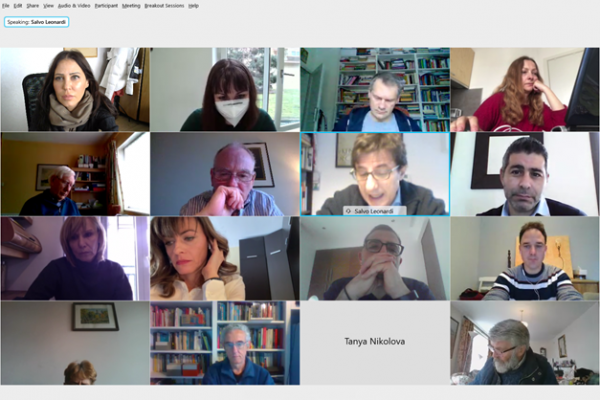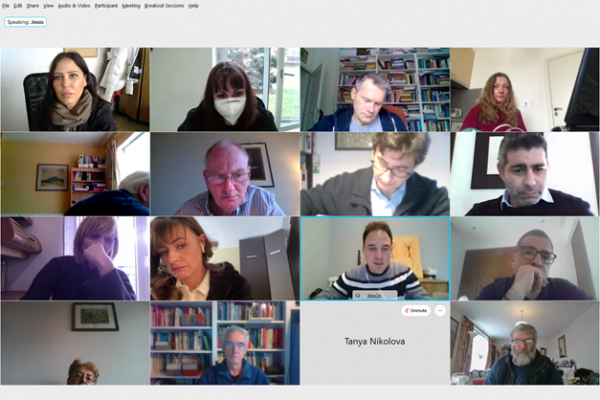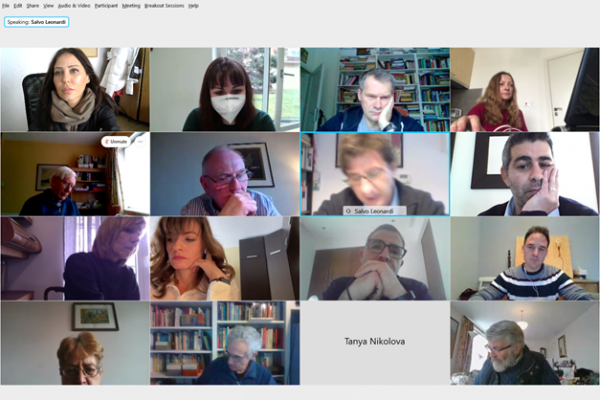IV Steering Committee Meeting - Expanding and Improving Workplace Democracy as a Prerequisite for Humanising Labour and Work Environment
|
Time |
Issue |
Speaker
|
|
12.00 |
Welcome and opening of the meeting |
Ina Atanasova |
|
12.15 |
Presentations of the results of the second stage of the research |
Representative of each co-beneficiary organization (approx. 15 min each) |
|
13.45 |
Some conclusions, observations and recommendations for the second stage results
|
M. Gold, E. Ribarova and Kevin P. O’Kelly |
|
14.15
|
First interim report (requirements, deadlines) |
Kevin P. O’Kelly
|
|
14.45
|
Planning the First Web Round Table (Dublin, Ireland – end of February) |
Ina Atanasova, Kevin P. O’Kelly, Brian McGann
|
|
15.30 |
End of the meeting |
|
IV Steering Committee Meeting - video record
NOTES ON ONLINE STEERING COMMITTEE MEETING
Participants:
Bulgaria:
Ina Atanasova, CITUB, Project Co-ordinator
Ekaterina Riberova, CITUB, DIRECT 2 Research Team Leader
Bistra Karadimova, CITUB
Elitsa Pesheva, CEIBG
Cyprus:
Evangelis Evangelou SEK
Christos Pelecanos, SEK.
Italy:
Salvo Leonardi, Fondazione Giuseppe Di Vittorio, CGIL
Ireland:
Brian McGann, Director, the IDEAS Institute
Tony Murphy, IDEAS Institute
Kevin P O’Kelly, Project External Expert
Poland:
Andrzej Zybała, SGH Warsaw School of Economics
Doroda Konopka, SGH Warsaw School of Economics
Spain:
Jesús Cruces Aguilera, Fundación 1° de mayo, CCOO
Alicia Martinez Poza, , Fundación 1° de mayo, CCOO
UK:
Michael Gold, Royal Holloway College, University of London
Opening
Ina Atanasova, CITUB, Project Co-ordinator, opened the meeting and make a number of organisational announcements:
- Under the contract, 20 February will be the end of Year 1 and she will have to prepare an interim report to send to the European Commission
- To do so, she requires Year 1 financial reports from all the partner organisations These should include staff costs and translation costs, so that an application can be made to get the next allocation of funds from the Commission
- She will circulate time-sheets for days worked on the project, translation costs, etc. and other relevant documentation to the partners
- She suggested a possible first project roundtable by end-February and asked if any partner would volunteer to organise such an event online.
In the following discussion, Brian McGann, Director, the IDEAS Institute (Ireland), said that SIPTU was starting a series of webinars and proposed that the Institute could organise a roundtable around this series. There would be a webinar on 3 February and he would arrange for colleagues to be invited to join. This was welcomed and agreed by the project partners.
Reports on progress, so far, on Phase 2 (National-level organisations)
Salvo Leonardi, FDV, CGIL: He has sent out fourteen Phase 2 questionnaires to national-level senior trade unionists and, so far, five have been returned – he had circulated these to colleagues earlier (he expects another two or three to be returned). He had replies from
- National secretary of CGIL
- National secretary of UIL
- Sectoral trade union leaders in
- Telecommunication
- Banking / finance
The employers’ organisation, Confindustria, did not respond to the questionnaire.
Many of the completed questionnaires contain written comments and he suggest that these ‘qualitive’ observations should be captured by a couple of paragraphs in the national report.
Phase 2 should be completed by 20 February.
*******
Jesús Cruces Aguilera and Alicia Martinez Poza, Fundación 1° de mayo, Confederacion Sindical de Comisiones Obreras (CCOO)
Phase 2 questionnaires have been sent to a number of trade union leaders, but it was found that there has been more success with ‘face-to-face’ interviews as a follow-up to the questionnaires.
Questionnaires were also sent to the employer organisations – however, they are reluctant to respond, so they are now looking for an alternative way to get the views of employers.
Two provinces, Navarre and the Basque Country, have initiated a dialogue on worker participation and interviews have been undertaken with the banking sector in the latter Region. They are hoping for more success with interviews in Phase 3.
They agreed with Salvo that the results from the questionnaires could be a paragraph or wo in the national report
********
Andrzej Zybała and Doroda Konopka, SGH Warsaw: The focus of the research is on two sectors – auto-manufacturing (FIAT/Chrysler Group, Poland) and telecommunications (Orange Telecom, Poland).
With FIAT/Chrysler, two interviews have been completed with a) at the trade union confederation level (with OPZZ) and b) with the chair of one of the plant-level trade unions and more interviews are planned. On the management side, an interview has been held with the Manager, Development and Personnel. All these interviews were open and useful.
The manufacturing plant has seen many changes in the past 20 years. A complete technology and organisational change has taken place, which resulted in redundancies that reduced the workforce from approximately 20,000 to the current level of 3,000. This reduction was successfully achieved through workplace dialogue and consultation, and good internal communications, which management is very committed to.
In Orange Telecom, six high-level interviews have been completed with the chair of the trade union alliance and with, on the management side, the chair of the management board (a non-executive member of the board). There has been a huge consultation and strategic management policy, again, since the 1990s, with a peaceful workforce reduction from 70,000 to 12,000 (approximately).
The current workforce is highly skilled and there is a need to retain them, as there is intense labour market competition for their skills in Poland. There are a range of different programmes to include employees in the ‘change process’. Many of these programmes are designed to improve the industrial relations climate by changing the organisational culture and climate. There is a focus on developing social dialogue through a series of Social Partner Pacts, which include agreement on financial packages for redundancies and these Pacts are reviewed and updated evert one or two years.
The ‘face-to-face’ interviews were very open and informative and are considered very important for the project. However, there are different responses from the different target groups and many found the questionnaire too difficult to respond to.
********
Evangelis Evangelou and Christos Pelecanos, SEK. Interviews have been carried out with General Secretaries of affiliated SEK sectoral trade union and with representatives of the employers’ organisations in two sectors – a pharmaceutical company and a semi-State enterprise (and possibly an enterprise in a third sector - transport). There will an interview with the Industrial Relations Department and the Labour Inspectorate of the Ministry of Labour, Welfare and Social Insurance ‘soon’, hopefully be end of week beginning 1 February. However, the Ministry staff are all busy with dealing with employment issues related to COVID-19 restrictions.
In some cases the returned questionnaires were followed up with online ‘face-to-face’ interviews, which were better. They see problems with ‘using’ the information gathered through the interviews for the national report, as it is ‘hard to get the real picture’ - respondents are inclined to give too positive a view of the issues covered.
They hope to have completed all interviews by end-February.
********
Ekaterina Riberova, CITUB, DIRECT 2 Research Team Leader and
Elitsa Pesheva, CEIBG
There have been three interviews with trade union leaders in three business sectors
- Construction
- Chemicals
- Communications
and with the national employers’ organisations relevant to a) - the Mining and Geological Association and b) - the National Pharmaceutical Association.
It has proved difficult to get any response from the Ministry of Labour and Social Policy because of the focus on COVID-19. Also, a lot of ministry focus is also on the general election which is scheduled for April!
It is proposed that all other interviews for Phase 2 will be completed by mid-February. It is clear, so far, from these sectoral-level interviews that digitalisation is well advance in sectors b) and c) – not so much in sector a). However, it is not clear, so far, how useful the information from these interviews will be for the writing of the national report.
********
Brian McGann and Tony Murphy, IDEAS Institute
The questionnaires have been distributed to target trade union leaders in the Irish Congress of Trade Unions and sectoral officials in SIPTU. The employers’ organisation, IBEC, are a bit reluctant to respond, but there might be a possibility at a later stage. With regard to the Dept (Ministry) of Enterprise Trade and Employment, Workplace and Skills Unit, because of all the changes in in departmental responsibilities after the last general election, it is difficult to find the key official to send to questionnaire to, but still looking at this.
For Phase 3, a number of target companies have been identified in the following business sectors:
- Communications
- Medical devises
- Food and drink
It is hoped that carry out six or seven interviews in Phase 3.
********
Discussion:
In summing up the presentations and progress, so far, Michael Gold, Royal Holloway College, said that one important point has emerged, that there is some difficulty in getting companies to respond to a ‘tick-box’ questionnaire. So, maybe, follow-up online interviews would augment the questionnaire responses, thus providing data for a ‘qualitive’ as well as a ‘quantitive’ analysis. In his view, the project is progressing very well.
Kevin P O’Kelly agreed and with regard to the possible difficulties in analysis the ‘tick-box’ responses, mentioned by some colleagues, he suggested that an appendix to the consolidated report could be a statistical tabulation of all responses from the different cohorts, such as trade unions; employers’ organisations; and others.
Ekaterina Riberova suggested that, for Phase 2, if it is difficult to get relevant data on collective bargaining at company levels, available documentation, such as annual reports, survey data on home-working, teleworking, etc. during Covis-19, could be used to get such relevant data.
She also suggested changing the order of the sections in the draft questionnaire for Phase 3 by moving the sections on Digitalisation and Humanisation of Work ahead of the questions on DP and asked what colleagues thought.
Phase 3 Questionnaire
The draft questionnaire will be circulated by Ina to colleagues for comment and suggested amendments today (29 January 2021). Any comments or suggested amendments should be sent to Ekaterina Riberova and Kevin P O’Kelly by 12 February, 2021, so a final draft can be prepared by end-February.




